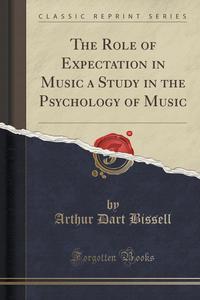Excerpt from The Role of Expectation in Music a Study in the Psychology of Music
Only a very few of those who show skill, or even attain celebrity, in any form of art arc expert students of the psychology of the art they practice, or of aesthetical philosophy in general. All artists are, of course, conscious of certain judgments and feelings which impel and guide their practical achievements. They may also suspect certain undefinable instincts and obscure impulses which cooperate to the same end. But they have never collated and analyzed or attempted to evaluate, the various phases of their conscious experience; even less have they uncovered the variety, force, and related influence, of the mental processes that hover about the borders of the conscious mental life, or belong to the sphere of the properly so-called "subsconscious." As to the metaphysical ground of the whole experience and of the whole realm of aesthetical endeavor and achievement in its relation to the world of reality, they have little interest. Indeed, they may regard such quest for the foundations of reality in man"s artistic life and work as unworthy of serious study.
On the other hand, only a few of those who have written and taught the psychological theory or metaphysics of any form of art, or of aesthetics in general, have been of marked artistic temperament, or have attained remarkable skill in any form of artistic achievement. Their psychology is rather a matter of remote inference, than of near and immediate experience. But the science of the aesthetical is not like the sciences of the physical or chemical order. Nor can it in all its most important and interesting phases be treated experimentally.
The greatest interest, as well as the greatest value, then, belongs to the opinions of those who are both artist and psychologist, in dealing with the psychology of any kind of art. And, on the whole, this would seem to be most emphatically true of the art of music. This is true because the art of music is so largely concerned with the expression, control, and appreciation, of certain sounds that are born of obscure origin, and no sooner born, rapidly die away, rather than of permanent facts which vision can with steadiness contemplate, and memory accurately record. The musician who is also a psychologist has, therefore, his unique value.
Dr. Bissell, for a life-time, for fully forty years, has been a careful student and teacher of psychology, and also a student, teacher, and composer of music. For some time he has been definitely and diligently studying the problem: "The Psychology of Music." As an expert, he has studied this problem, not simply as it appeared in his own experience, but as it appears in the musical compositions of many scores of musical composers.
The psychology of music is a theme so vast and varied as to be beyond the compass of any one man, no matter how well fitted for the task. For a "Doctor"s Thesis," however, it is required that some definite theme shall be chosen, expressible and precise, and capable of something approaching at least an answer which shall challenge debate, but which shall, at the same time, promise some contribution of distinct value to human knowledge on the subject. Much time and great care were taken in selecting such a theme for treatment in this thesis. Nowhere else, so far as I am aware, has this particular detailed inquiry into a certain problem of the psychology of music been attempted by any writer, whether competent or incompetent. For the special competency of Dr. Bissell, and for the great amount of expert knowledge which he has put upon the treatment, I bear witness with pleasure.
About the Publisher
Forgotten Books publishes hundreds of thousands of rare and classic books. Find more at www.forgottenbooks.com Это и многое другое вы найдете в книге The Role of Expectation in Music a Study in the Psychology of Music (Classic Reprint)
